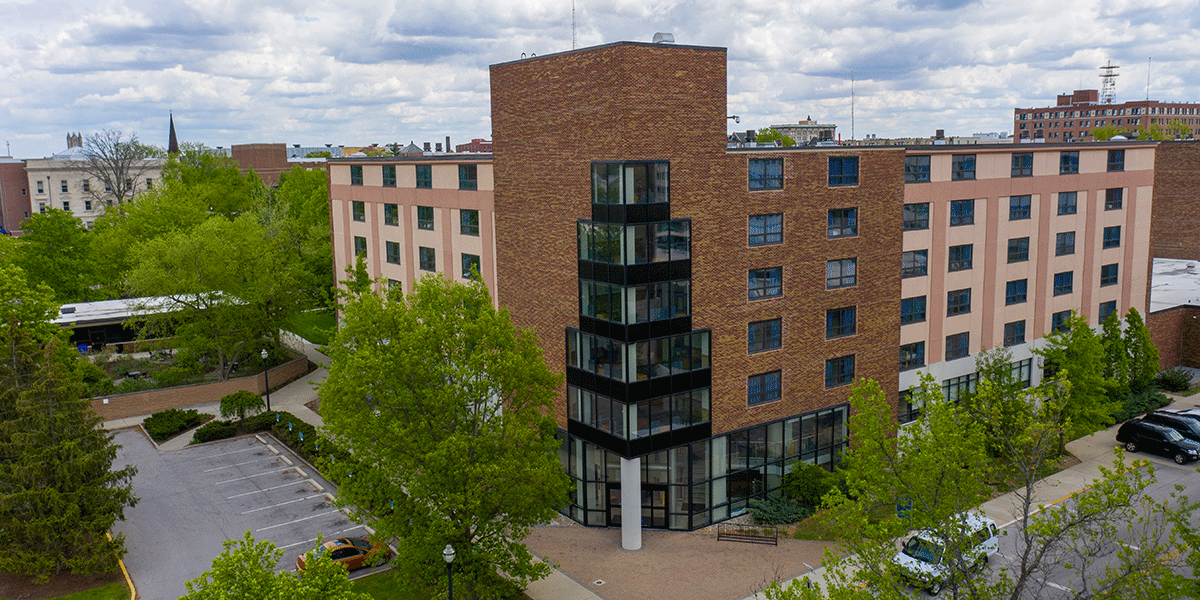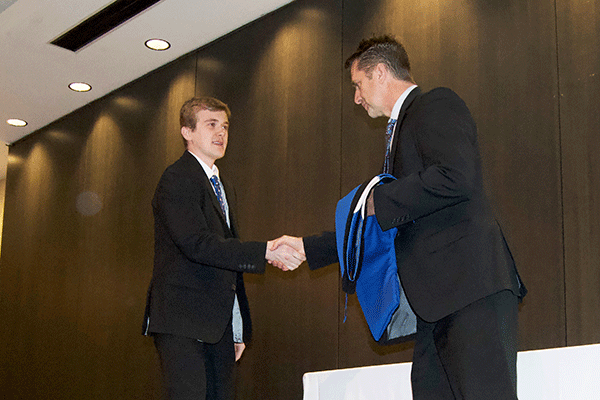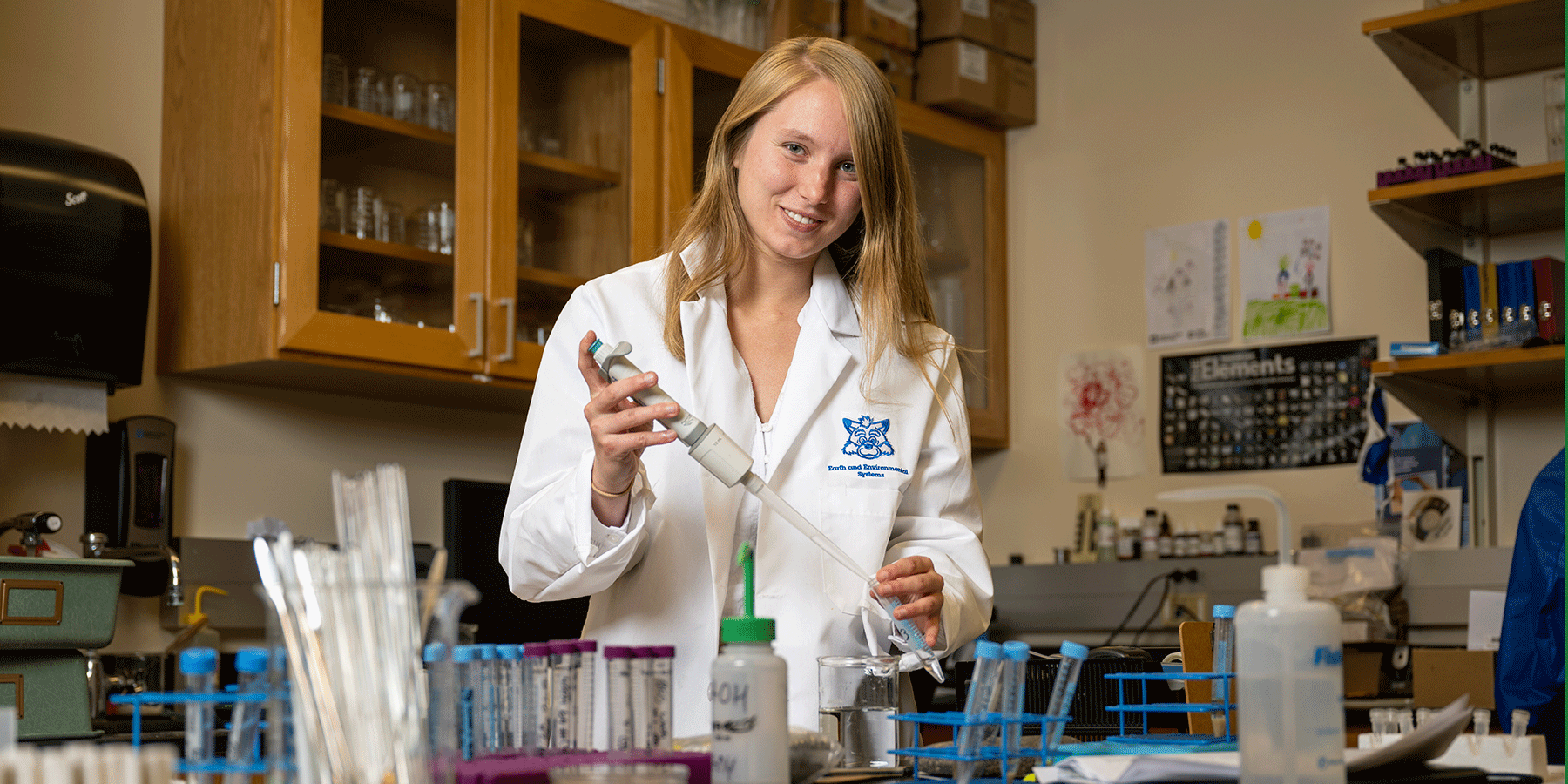Welcome to the Honors College!
The Honors College at Indiana State University offers classes and experiences to enrich students’ education, expand their global and cultural perspectives, and prepare them for advanced academic work and rewarding professional careers.
Honors students participate in a core of small, powerful classes, led by committed faculty who are passionate about their disciplines and dedicated to helping students learn, grow, and achieve.

By the Numbers
Mission & Vision
The mission of the Honors College is to provide a supportive and stimulating environment for high-achieving students. This academic community features interdisciplinary courses taught by dedicated faculty and co-curricular experiences at ISU and beyond, including opportunities for research, leadership, community engagement, and study abroad. This mission is accomplished by:
- Challenging and supporting Honors students by exposing them to innovative approaches and diverse perspectives in order to provide them the skills and confidence to confront complex multi-disciplinary issues;
- Facilitating intellectual engagement and the exchange of ideas, both inside and outside the classroom;
- Providing opportunities for initiative, leadership, and service through experiential learning and community involvement;
- Encouraging cross-cultural experiences that expand awareness and deepen understanding of the world.
The long-term vision of the Honors College is:
To graduate students with a life-long passion to learn, who are able to apply critical thought and imagination in their professional lives and as global citizens.
Community
Pickerl Hall and Burford Hall are the primary Honors residence halls for incoming Honors students. Honors students are not required to live in Honors housing; however, choosing to reside in an Honors living-learning community gives Honors students opportunities to develop friendships and form study groups with peers from all different majors in the Honors College. Returning Honors students are invited to live on an Honors floor in 500 Wabash, which is located one block away from campus. 500 Wabash gives Honors students entering their second, third, or fourth year at ISU an opportunity to continue living on a floor with other Honors students in an apartment-style residence hall with private bedrooms and fully furnished living rooms and kitchens. Most apartments have four bedrooms, a living room, a kitchen, and two bathrooms.
Benefits of living in Honors housing include:
- Living with and around other Honors students
- An Honors Resident Assistant (RA) lives on each floor
- Private bathrooms
- Central air conditioning
- Quiet hours on each floor
- Floor lounges for studying and hanging out
- Programming space for Honors events
- A short walk from most classroom buildings
For more information, please visit the Residential Life website.

Honors students studying in a room in Pickerl Hall.
The Honors Council is a student organization that primarily focuses on planning social and philanthropic events. Honors Council members are elected leaders and also serve as representatives of the Honors student body.
The Honors Peer Mentors are experienced students in the Honors College who mentor first-year Honors students as they adjust to life at Indiana State University. Each incoming Honors student is networked with a peer mentor, who will offer advice, answer questions, and be a friendly face on campus as you transition into the ISU community. The Honors Peer Mentors are involved in numerous organizations on campus and also with the Honors College, so they know first-hand what it is like to be a motivated student, take Honors classes, live on campus, study abroad, and effectively balance time between school and extra-curricular commitments.

Honors Council leaders in front of the Indiana State University Fountain
Experience
The Honors College regularly partners with the Career Center to offer programs that will help you prepare for your future. We work with the Career Center to offer interactive workshops, designed intentionally with Honors students in mind, to help you write a résumé, prepare for interviews, learn about graduate school resources, apply for internships, and network with professionals. An ISU Career Coach also holds weekly office hours in the Pickerl Hall lobby and Honors students are welcome to stop by for help with résumé or job search questions.
The GH 401 Honors thesis experience is intended to:
- Provide you a significant research experience
- Enable you to demonstrate your proficiency at research
- Culminate your Honors College curriculum, linking elements of the Honors coursework with your larger degree program and/or interests.
- Prepare you for professional writing, presentation and research activities and/or for graduate or professional school requirements.
Adventure
Indiana State University students explored Greece as part of an Honors College course led by Marilyn Bisch, a senior instructor specializing in Latin and ancient Greek languages, literature, and culture. In addition to exploring the country, each student was tasked with completing a research project based on a site or topic explored during the trip, and then presented their findings at the conclusion of the course. READ MORE
Timmy Global Health is a nonprofit organization dedicated to expanding access to healthcare and addressing global healthcare challenges. As members of the ISU chapter, Honors students have the opportunity to enroll in GH 301: Global Healthcare Challenges to learn about about healthcare disparities in developing countries and participate in a medical service trip to Ecuador.

Scholarships and Financial Aid
Incoming freshmen may be competitive for a variety of Indiana State University scholarships (including President's and University Honors scholarships), which are awarded through ISU's Office of Scholarships. There are also several awards offered by the Honors College to assist current Honors students during their sophomore, junior, or senior year.
Search the Branch for scholarships